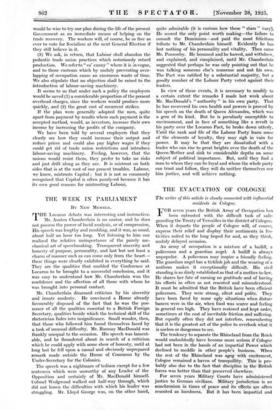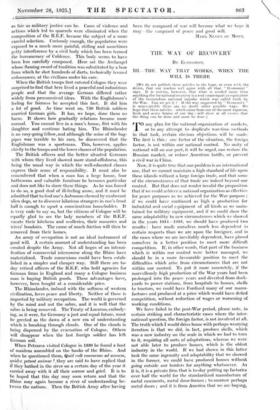THE EVACUATION OF COLOGNE
The writer of this article is closely connected with influential residents in' Cologne.
FOR seven years the British ArmY of Occupation has been entrusted with the difficult task of safe- guarding the Treaty of Versailles in the distriefof Cologne. When it departs the people of Cologne will, of course, express their relief and display their sentiments in fes- tivities suited to the long hoped for and, us they think, unduly delayed occasion.
An army of occupation is a mixture of a bailiff, a policeman and a guardian angel. A bailiff is always unpopular. A policeman may .inspire . a friendly feeling. The guardian angel has a ticklish job and the wearing of a uniform makes it exceptionally diffiCult. His civil standing is as dimly established as that of a mother-in-law. He shares. her fate of earning no gratitude_ and of having his efforts as often as not resented and, misunderstood. It must be admitted that the British have been efficient policemen. They were strong, silent and polite. They have been faced by some ugly situations when distur- bances were in the air, when food was scarce and feeling in general ran high. They have restored and kept order, sometimes at the cost of inevitable friction and Suffering. But equally often they did not interfere, remembering that it is the greatest art of the police to overlook what it is useless or dangerous to see.
The tendency to separate the Rhineland from the Reich would undoubtedly have become more serious if Cologne had not been in the hands of an impartial Power which declined to meddle in other people's business. When the rest of the Rhineland was agog with excitement, Cologne remained a haven of tranquillity. This is pro- bably also due to the fact that discipline in the British forces was better than that preserved elsewhere.
For seven yeara Military Courts have administered justice to German civilian& Military jurisdiction is an anachronisth in times of peace and its effects are often resented as harshness. But it has been impartial and as fair as military justice can be. Cases of violence and actions which led to quarrels were eliminated when the composition of the B.E.F. became the subject of a more careful selection. Curiously enough, the population were exposed to a much more painful, stifling and sometimes petty interference by a civil body which has been termed the bureaucracy of Coblence. This body seems to have been less carefully composed. Here sat the Archangel whose flaming sword of tradition was substituted by a bow from which he shot hundreds of darts, technically termed 'ordoanances, at the civilians under his care.
When the British troops first entered Cologne they were surprised to find that here lived a peaceful and industrious people and that the average German differed rather widely from preconceived ideas. With the Englishman's feeling for fairness he accepted this .fact. It did him a lot of good. As time went on, 750 British soldiers married German girls. It has, we hope, done them no harm. It shows how gradually relations became more normal. You cannot live in a man's house, flirt with his daughter and continue hating him. The Rhinelander is an easy-going fellow, and although the noise of the bag- pipes_ was terrible to his ears, he discovered that the Englishman was a sportsman. This, however, applies chiefly to ttie.troops and the lower classes of the population. The British officers and the better situated Germans with whom they .1iyed showed more stand-offishness, this being the usual way in which the well-educated classes express their sense of, responsibility. It must also be remembered that when a man has a large house, four bathrooms and valuable furniture he becomes particular and does not like to share these things. As he'was forced to do so, a good deal of ill-feeling arose, and it must be admitted that to find one's Aubusson chewed by exuberant alien dogs, or to discover hilarious strangers in one's front hall is enough to upset a conscientious householder. It is very rude to say so, but the citizens of Cologne will be equally glad to see the lady members of the B.E.F. vacate their kitchens and sculleries, their nurseries and wives' boudoirs. The cause of much friction will then be removed from their homes.
An army of occupation is not an ideal instrument of good will. A certain amount of understanding has been created despite the Army. Not all hopes of an intensi- fication of commercial intercourse along the Rhine have materialized. Trade connexions could have been estab- lished in .a simpler and cheaper way. Still there are to- day retired officers of the B.E.F. who hold agencies for German firms in England and many a Cologne business man is buying British goods. These advantages have, however, been bought at a considerable price.
The Rhinelander, imbued with the softness of western civilization, loves peace and liberty. Neither of these is imparted by military occupation. The world is governed by the mind and not the sabre, and it is well that the sabre is being removed. . The Treaty of Locarno, embody- ing, as it were, for Germany a just and equal future, must be greeted as the dawn of a new era of understanding which is breaking through clouds. One of the clouds is being dispersed by the _ evacuation of Cologne. Others will disappear when the last foreign soldier has left German soil.
When Petrarca visited Cologne in 1880 he found a host of maidens assembled on the banks of the Rhine. And when he questioned them, Quid vult concursus ad amnem, quicive petunt animae ?.they are said to have replied that if they bathed in the river on a certain day of the year it carried away with it all their sorrow and grief. It is to be hoped that this day may soon return and that the Rhine may again become a river of understanding be- tween the nations. Then _the British Army after having been the rearguard of war will become what we hope it may--the vanguard of peace and good will.
MARK NEVEN MON"Ve























































 Previous page
Previous page